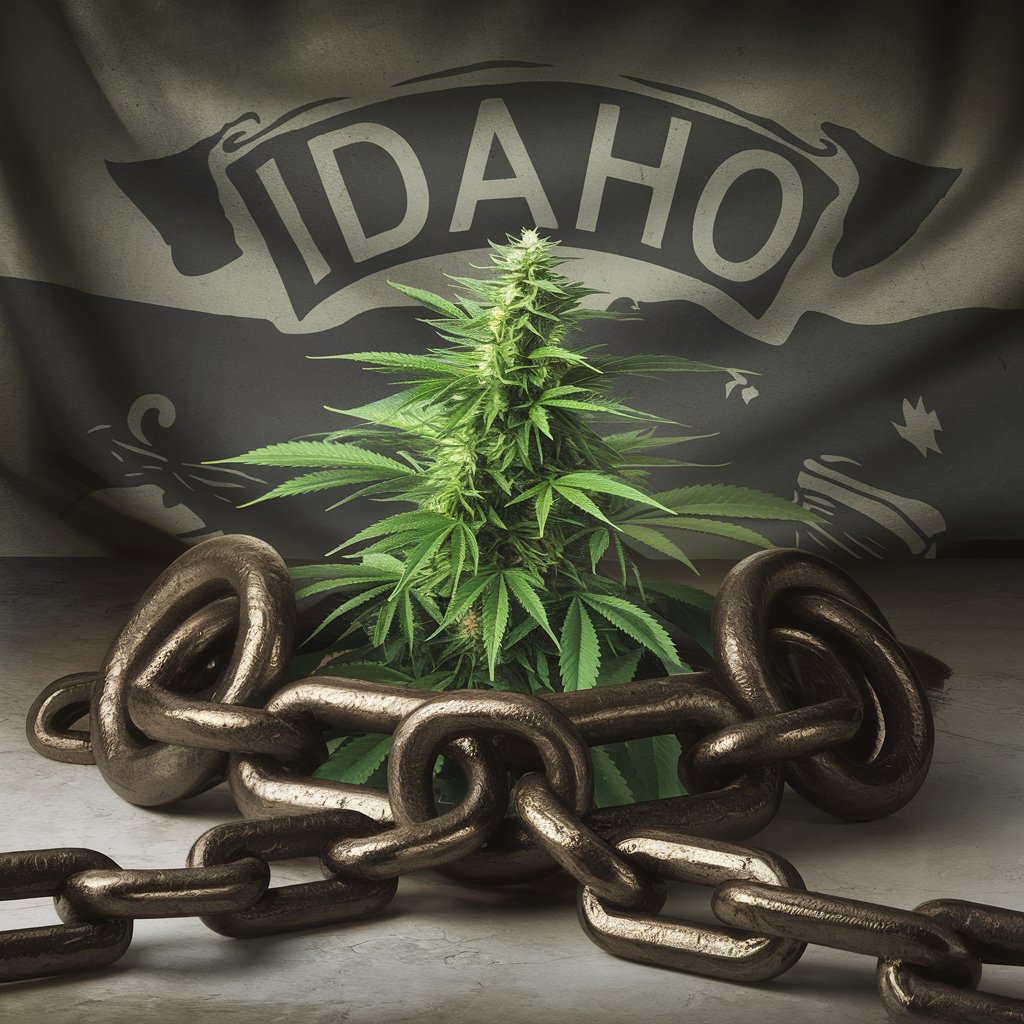Idaho House Bill 7 enforces outdated penalties for marijuana possession, hindering progress and perpetuating stigma against sensible cannabis reform.
As marijuana legalization transforms the nation, Idaho stubbornly clings to its punitive past, resisting progress with measures like House Bill 7. Passing with a decisive 54 to 14 victory, the legislation seeks to further fortify cannabis prohibition at a time when the majority of the nation is progressing in the opposite direction.
The bill, which mandates a minimum $300 fine for possession of up to three ounces of marijuana, reinforces prohibitionist ideals that ignore evidence-based drug policy. Far from serving justice, this legislation perpetuates systemic harm, disproportionately targets vulnerable populations, and benefits the prison industrial complex at the expense of Idahoans’ freedoms.
House Bill 7 isn’t just an outdated policy; it’s a deliberate effort to maintain an unjust status quo. By entrenching mandatory minimums, the bill ensures that individuals caught with small amounts of marijuana face steep penalties that do little to deter use but plenty to exacerbate inequities and fuel cycles of poverty and incarceration.
Provisions of House Bill 7
House Bill 7 imposes a $300 mandatory minimum fine for possessing up to three ounces of marijuana. On the surface, this penalty may seem modest, but it carries profound implications. Mandatory minimums eliminate judicial discretion, treating every case with the same blunt force regardless of context. This inflexibility disproportionately punishes low-income individuals who often lack the resources to navigate the judicial system.
Despite widespread opposition to such measures nationwide, the bill passed the Idaho House of Representatives and awaits review in the Senate. Its progress highlights Idaho lawmakers’ staunch commitment to prohibition, even as data from other states demonstrates the economic, social, and public health benefits of legalization.
The Injustice of Mandatory Minimums
Mandatory minimums like those in House Bill 7 are a boon for the prison industrial complex, which thrives on mass incarceration. By criminalizing minor marijuana offenses, the system funnels more individuals into the pipeline of fines, court fees, and even jail time for nonpayment. Private prisons and correctional facilities profit immensely from policies that increase inmate populations, creating a perverse incentive to maintain and expand these penalties.
Mandatory minimums do more than impose financial burdens—they trap individuals in a cycle of poverty and criminalization, leading to large scale recidivism.
A $300 fine may seem manageable for some, but for low-income offenders, it can lead to additional fees, legal complications, and even incarceration for failure to pay. Once caught in the system, these individuals face barriers to employment, housing, and education, increasing the likelihood of reoffending.
Idaho’s mandatory minimums are not applied equally. Studies consistently show that marijuana laws are disproportionately enforced against people of color and low-income communities, despite similar usage rates across demographic groups. This disparity perpetuates systemic and quintile inequities, reinforcing cycles of generational poverty and disenfranchisement.

Supporters’ Arguments: A Flawed Justification
Supporters of House Bill 7, such as Representative Bruce Skaug, claim that the bill’s strict penalties will deter drug use and help keep “marijuana from becoming normalized in our state, and use of it,” as Skaug said Tuesday.
“Not long ago, all 50 states of this nation outlawed marijuana,” he added, apparently unaware of how out of touch such a sentiment is, given that 39 states of this nation have moved to decriminalize cannabis to some degree. If strength in numbers is his argument, one might want to point out to the congressman that the numbers are no longer on the side of the aging “Reefer Madness” contingent.
However, decades of data from the failed War on Drugs reveal the ineffectiveness of punitive measures in reducing drug use. Instead, these policies exacerbate social inequities without addressing the root causes of substance abuse.
While law enforcement groups like the Fraternal Order of Police back the bill, their support suggests a vested interest in maintaining the status quo. Increased penalties lead to more arrests, which bolster budgets and justify the expansion of police departments. Similarly, GOP lawmakers supporting the bill frame it as a moral crusade, using fear-based rhetoric to rally their base while ignoring the evidence that legalization can reduce crime and improve public health.
Opponents Push Back
Opponents, including House Minority Leader Ilana Rubel, argue that mandatory minimums strip judges of their ability to issue fair sentences based on individual circumstances. This rigidity often results in disproportionately harsh penalties for minor infractions, clogging court systems and burdening taxpayers with unnecessary legal costs.
Jeremy Kitzhaber and other medical cannabis users have testified to the harm this bill would inflict on patients who rely on cannabis for chronic conditions. Criminalizing their access not only punishes them for seeking relief but also exacerbates stigma around medical marijuana, discouraging others from pursuing treatment.
Critics warn that the bill will exacerbate Idaho’s existing inequalities. Low-income individuals and communities of color will bear the brunt of enforcement, perpetuating cycles of poverty and criminalization. Meanwhile, Idaho’s refusal to legalize cannabis deprives the state of millions in potential tax revenue that could be reinvested in education, healthcare, and public safety.
The Broader Cost of Prohibition
Mandatory minimums burden more than the individuals they penalize. They drain public resources by increasing arrests, overcrowding jails, and overloading courts with minor possession cases. Taxpayers foot the bill for these inefficiencies while losing out on the economic benefits of a regulated cannabis market.
Idaho’s resistance to legalization isolates it from the broader trend of reform sweeping the nation. States that have embraced legalization have seen reductions in drug-related arrests, improved public health outcomes, and significant economic gains. Idaho’s outdated policies make it an outlier, clinging to the past as others move forward.
A Better Path Forward
Idaho’s reliance on punitive measures like those in House Bill 7 reflects a failure to adapt to the realities of modern drug policy. Legalization and regulation offer proven benefits, from generating tax revenue to reducing crime and addressing health disparities. Rather than perpetuating harm through mandatory minimums, Idaho lawmakers should prioritize compassion, education, and evidence-based solutions.
The fight against House Bill 7 is more than a battle over cannabis—it’s a call to reject the forces of the prison industrial complex, challenge systemic inequities, and embrace a future where drug policy serves the people, not private interests.

***
GreenPharms is more than just a dispensary. We are a family-owned and operated company that cultivates, processes, and sells high-quality cannabis products in Arizona. Whether you are looking for medical or recreational marijuana, we have something for everyone. From flower, edibles, concentrates, and topicals, to accessories, apparel, and education, we offer a wide range of marijuana strains, products and services to suit your needs and preferences. Our friendly and knowledgeable staff are always ready to assist you and answer any questions you may have. Visit our dispensaries in Mesa and Flagstaff, or shop online and get your order delivered to your door. At GreenPharms, we are cultivating a different kind of care.
Follow us on social media





